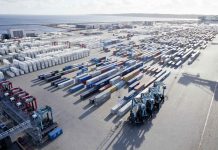
The Port of Barcelona, APM Terminals (APMT) Barcelona, HAM and Naturgy have concluded a pilot which tested the viability of using natural gas as a fuel in port equipment and arose positive results with certified reductions in greenhouse gas emissions, specifically in CO and CO2, compared to diesel-powered machines.
During the project, which began in January 2016, an APM Terminals Barcelona straddle carrier was converted to natural gas. On the test bench, its fuel consumption was reduced by 11%, which could provide an economic boost for the transformation or purchase of new gas-powered machines, according to APMT.
Total hydrocarbon emissions were also reduced through the use of natural gas, according to tests carried out with APM Terminals Barcelona’s straddle carrier. To achieve a reduction in nitrogen oxides, the tests concluded that the installation of catalytic converters is required.
With a budget of US$1.37 million (1.22€ million), the project, which is coordinated by the Spanish energy company Enagás and co-financed by the European Union, is part of the Core LNGas hive project of an overall budget of US$37.45 million (33.3€ million).
For the straddle carrier adaption project, Idiada, a Catalan multinational in the sector of engineering and homologation for the automotive sector, was responsible for modifying the diesel engine for use with natural gas, while APMT Barcelona was in charge of the assembly and commissioning of the converted straddle carrier.
Tests carried out on Idiada Powertrain’s test bench and at APM Terminals Barcelona’s facilities, verified that engines converted to 100% natural gas could provide the required performance while producing lower emissions.
The main challenge for the pilot, however, was to ensure that it didn’t disturb ongoing operations at the terminal and did not increase safety risks for port workers.
Hence, the Spanish terminal carried out a range of risk studies to determine the feasibility of using natural gas and the implementation of safety measures. The machine was able to operate within the terminal’s normal operations, with similar autonomy to diesel.
Furthermore, during the project, HAM, the Barcelona-based company with a network of gas stations and liquefied natural gas (LNG) transport facilities in Europe, installed a 600-litre LNG tank and a piping system to feed the converted engine, while it also enabled LNG refuelling.
The natural gas and electrical energy utilities company Naturgy carried out an LNG supply logistics study, both from a technical and economic point of view. It also examined different supply alternatives for terminal equipment, with the most viable option being the use of a mobile station developed by HAM.
Last but not least, the Port of Barcelona, which has set the priority of reducing pollutant emissions and greenhouse gases by 100% until 2050, coordinated the project both technically and financially and carried out the safety studies.





